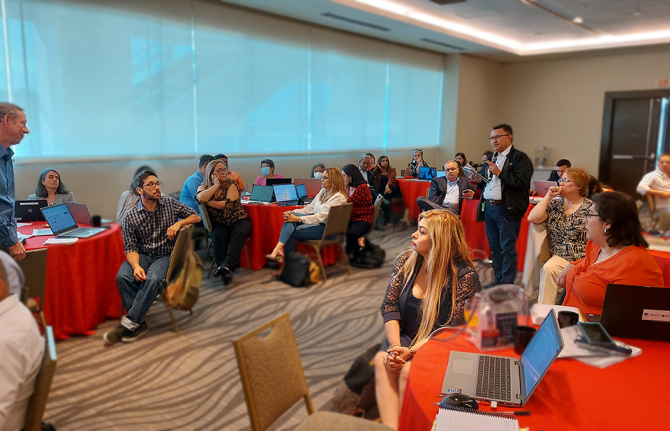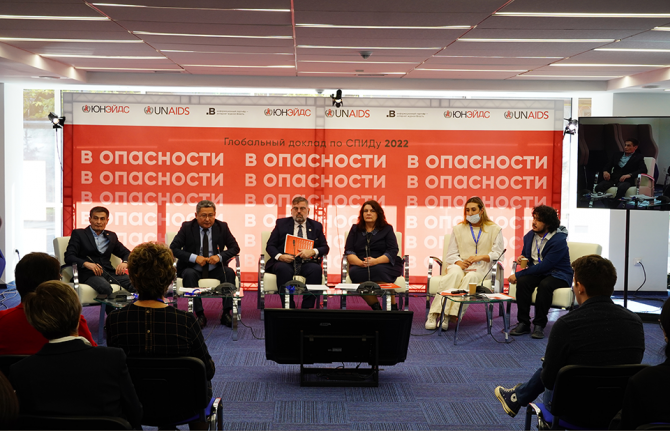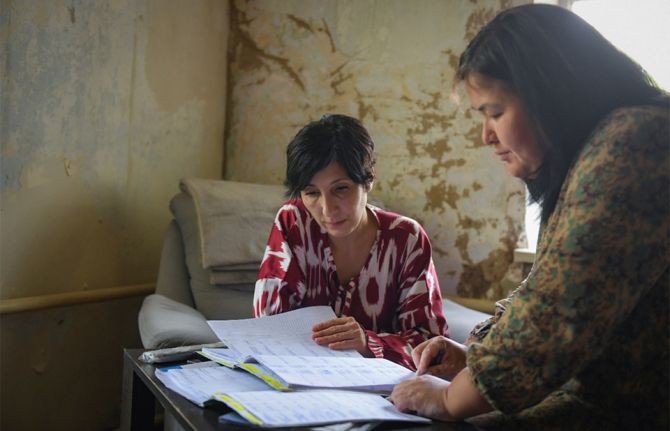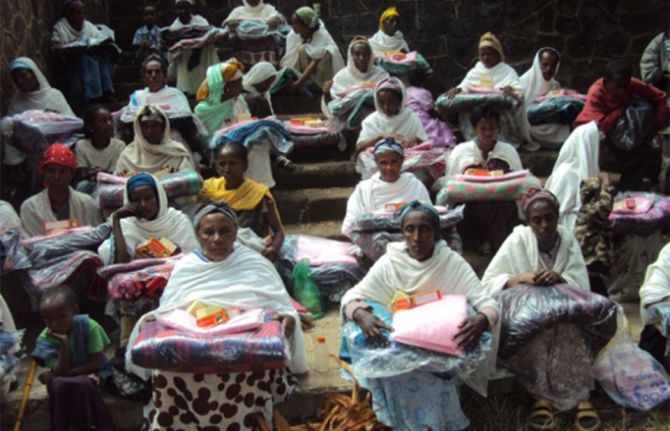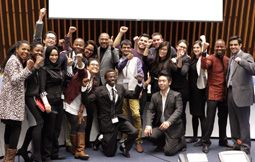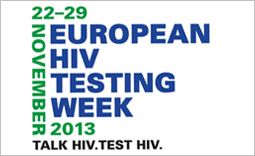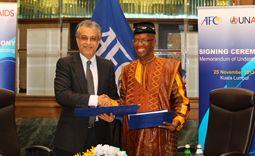
Feature Story
Consultation held on definition and measurement of concurrent sexual partnerships
24 April 2009
24 April 2009 24 April 2009It has long been suggested that concurrent sexual partnerships are one component responsible for creating sexual contact networks conducive to the rapid spread of HIV. Recently the idea has gained prominence and momentum, with national HIV programmes beginning to plan prevention campaigns targeted at reducing concurrent partnerships. However, in both the scientific and programmatic communities, research and discussion about concurrent partnerships and their role in the spread of HIV have been impeded by lack of clarity about the definition and appropriate indicators of concurrency.
On 20-21 April 2009, the UNAIDS Reference Group on Estimates, Modelling, and Projections convened a meeting to discuss the definition and measurement of concurrent sexual partnerships in Nairobi, Kenya. The meeting brought together a group of 35 experts, representing those working on large-scale cross-sectional surveys, longitudinal cohort studies, researchers using sexual behaviour and concurrent partnership data, and monitoring and evaluation specialists.
The main aim of the meeting was to reach consensus on what should be measured in large-scale surveys to best capture the amount of concurrency in a population and to monitor the impact of programmes. Topics covered included a history and overview of concurrent partnerships and HIV, comparisons of the definitions, methods, and questions used to measure concurrency, the reliability of sexual behaviour data, the measurement of concurrency in large cross sectional surveys and in longitudinal cohort studies.
Overlapping sexual partnerships where sexual intercourse with one partner occurs between two acts of intercourse with another partner.
Agreed definition of "concurrent partnerships"
At the close of the meeting, meeting participants reached consensus that the definition of concurrent partnerships should be “overlapping sexual partnerships where sexual intercourse with one partner occurs between two acts of intercourse with another partner”, and recommended that the point prevalence of concurrent partnerships in the adult population, that is the proportion of adults aged 15-49 reporting more than one ongoing sexual partnership at an instant in time, be used as the main indicator of concurrent partnerships in a population. This measure best distinguishes between concurrency and rapid serial monogamy.
Additionally, the Reference Group discussed other useful indicators of concurrent partnerships in a population (including the cumulative prevalence of concurrent partnerships in the adult population over a 1 year period), and made recommendations for further research into the methods of measuring concurrent partnerships and sexual behaviour, the relationship between concurrency and HIV transmission, and social norms around concurrent partnerships.
A set of specific recommendations on how to capture the proposed indicator will be provided to the UNAIDS Monitoring and Evaluation Reference Group and to the implementing organizations of large household surveys by end of April, 2009. A full meeting report will be available by end of May, 2009.
Right Hand Content
Feature stories:
Talking about OneLove in Southern Africa (06 February 2009)
Related
 An HIV vaccine: who needs it?
An HIV vaccine: who needs it?

21 July 2021

Feature Story
UNODC and Brazil promote action on AIDS in prison settings
22 April 2009
22 April 2009 22 April 2009A version of this story is also published at UNODC.org

The first national consultation on HIV in prison settings took place in Brasilia 31 March to 2 April 2009.
Credit: UNODC
Much more needs to be done to improve AIDS prevention, treatment and care services in Brazil’s prisons. This was the major conclusion emerging from the first national consultation on HIV in prison settings which took place in Brasilia between 31 March and 2 April.
Organized by Brazil's Ministry of Health and Ministry of Justice in partnership with the United Nations Office on Drugs and Crime (UNODC), the objective of the consultation was to discuss and propose an agenda with an action plan to provide prevention, treatment, care and support services aimed at addressing HIV, other sexually transmitted infections and co-infections such as tuberculosis and hepatitis in prisons.
"UNODC is committed to supporting the Government of Brazil in the provision of HIV prevention and care services to the prison population," said UNODC Representative for Brazil and the Southern Cone, Giovanni Quaglia.
The national consultation was attended by around 150 professionals. These included specialists from the key ministries, representatives from all 26 states of Brazil and the Federal District (where the capital is located), health professionals working in prison settings, members of the national harm reduction network, representatives of the Brazilian segment of the International Commission for Catholic Prison Pastoral Care and members of the National Network of People Living with HIV/AIDS.
UNODC is committed to supporting the Government of Brazil in the provision of HIV prevention and care services to the prison population.
Giovanni Quaglia, UNODC Representative for Brazil and the Southern Cone
As in most countries, Brazil has a higher HIV prevalence in the prison population than among the general population. According to the most recent research, a local study published in 2007, found rates of 5.7% among certain prisoners. In contrast, UNAIDS reports that by the end of 2007, general adult prevalence was 0.6%.
It is estimated that the country has approximately 420,000 prisoners living in often violent conditions where overcrowding, lack of access to medical services and unsanitary surroundings can lead to greater vulnerability to HIV and other infectious viruses such as tuberculosis and hepatitis. These conditions can also increase AIDS-related deaths and undermine attempts to implement an effective response to the epidemic in prisons.
Liliana Pittaluga, Technical Adviser at the Prevention Unit of the National STD and AIDS Programme, said that the consultation was a symbol of the solid partnership between the Government of Brazil and UNODC. "The cooperation between sectors is crucial to improve the health care and prevention services made available inside prison settings. We are confident that the results of this consultation will not only result in an exchange of experiences, but also in building a process of actions that will have a positive effect in the prison system at the country level."
The main outcome of the consultation was the commitment made by the Ministry of Health, the Ministry of Justice and UNODC to form a working group which will design a national operative plan with guidelines, targets and deadlines. In addition, civil society organizations, the Pan-American Health Organization (PAHO) and UNAIDS will be part of this group.
As well as UNODC, UNAIDS and PAHO/World Health Organization, also participating in the meeting were the United Nations Educational, Scientific and Cultural Organization (UNESCO) and the United Nations Population Fund (UNFPA). Health and justice experts from the Southern Cone region also attended as observers, at the invitation of UNODC.
Right Hand Content
Cosponsors:
Feature stories:
ICASA 2008: HIV in prison settings (06 December 2008)
Publications:
HIV and prisons in sub-Saharan Africa (pdf, 2.12 Mb)
Related

Feature Story
AIDS responses in action in rural Ethiopia
22 April 2009
22 April 2009 22 April 2009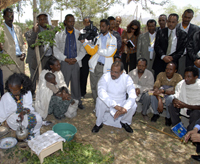
UNAIDS Executive Director Michel Sidibé joins a village “community conversation” in the Tigray Region of Ethiopia, 800kms from Addis Ababa, 22 April 2009. Credit: UNAIDS/Y.Gebremedhin
Across Ethiopia, community initiatives and local government are coming together to make a difference in the AIDS response. During his official travel to the country, UNAIDS Executive Director Michel Sidibé visited some of the programmes and projects putting into action the goals of universal access to HIV prevention, treatment, care and support services.
Adegude Health Center
At the heart of health service delivery in Ethiopia are the government-run local health centres which deliver primary health services such as family health, communicable disease prevention and control, including HIV, and health education.
Michel Sidibé was invited to visit the Adegude Health Center, one of five local health centres in Hintalowagrit District, which provides voluntary HIV counseling and testing services, as well as prevention of mother to child transmission and HIV treatment. Staff working at the centre gave an overview of the HIV services that they deliver in this rural area of Ethiopia to Mr Sidibé and shared their achievements as well as the challenges they face. District health office officials also shared experience of coordinating the multi-sectoral AIDS response, implementation of HIV programmes and service delivery.
Community conversations
Governments, people living with HIV, civil society leaders, and partners—we all need creative platforms to join in open discussion of the issues and identify ways to move forward together in the AIDS response.
Michel Sidibé, UNAIDS Executive Director
Mr Sidibé also had an opportunity to observe one of the “community conversations” in Hiwane Kebele where a cross-section of people—women and men, old and young, people living with HIV, representatives from women’s associations and youth groups join local religious and traditional leaders who have the ability to influence and bring change—regularly come together.
“Community conversations” are taking place across rural Ethiopia and studies show that they can be agents of change in the AIDS response. Once a week or fortnight in villages, or “Kebeles”, up to 70 people gather for a couple of hours with trained local facilitators to exchange their views on a range of social topics.
The village gatherings enable taboos to be aired and misunderstandings about sex and AIDS to be clarified. Traditional practices that may be factors in the spread of HIV are also discussed.
The “conversations” have changed opinion and even translated into action. For example, in some localities groups have condemned early marriage and committed to protecting school girls from discontinuing their education. Others decided to stop female genital cutting in their areas or some participants reached a consensus to avoid practices like widow inheritance. The importance of leveraging AIDS responses to deliver broader development results including gender equality and human rights is a point often emphasized by Mr Sidibé.
The local events also enable issues—such as stigma—to be explored collectively and can be a forum from which community actions are initiated such as HIV prevention, home based care, support for orphans, and increased take up of voluntary counselling and testing.
Facilitators explained how community conversations were first developed by UNDP and piloted from 2003 to 2004 in Ethiopia. The pilot was more successful than expected and federal authorities have since made community conversations a priority strategy for community mobilization across the country.
“The local community conversation I have witnessed is an inspiration. Governments, people living with HIV, civil society leaders, and partners—we all need creative platforms to join in open discussion of the issues and identify ways to move forward together in the AIDS response,” said Mr Sidibé.
People living with HIV in the region
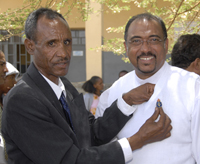
(from left): Hailemariam Kiflay, Chairperson of “Save the Generation Association” gives a pin to Mr Sidibé during his visit with this umbrella network of people living with HIV in Tigray. Credit: UNAIDS/Y.Gebremedhin
The Executive Director also met with the Chairman and Board Members of the “Save the Generation Association Tigray” umbrella network of people living with HIV in Tigray National Regional State. The Network promotes the rights of its members, fight stigma and assists regional efforts to scale up HIV prevention, treatment, care and support services. According to the Federal Ministry of Health an estimated 62,000 people are living with HIV in the region and 63% of those in need of HIV treatment have access to it.
Care and support of vulnerable children
Around 650,000 children have been orphaned by AIDS in Ethiopia. Mr Sidibé visited a care and support project for orphans and vulnerable children and affected families in Mekelle. The project, run by Human Being Association of Brotherhood, began in 2001 to support orphans and vulnerable children and families under difficult circumstances and today provides basic and educational support to over 1000 families caring for orphans and vulnerable children. It also provides vocational training, equipment and seed money to street children and child sex workers to enable them to have their own income and continue their education. Other support services include reuniting street children with extended families and legal support for children to inherit property and pensions of their families who died of AIDS-related illnesses.
The Ethiopian Minister of Health Dr Tedros Adhanom accompanied Mr Sidibé on these site visits.
The government of Ethiopia has set ambitious targets to achieve universal access to HIV prevention, treatment, care and support and developed a multi-sectoral Plan of Action for 2007 to 2010. This was developed in consultation with a broad range of stakeholders, who shared lessons learned during implementation of the AIDS response. The plan includes detailed activities, targets, cost estimations and a financial gap analysis and represents a major step towards the realization of the ‘Three Ones’ principles.
Right Hand Content
Multimedia:
Feature stories:
UNAIDS Executive Director visits Ethiopia (20 April 2009)
ILO: Action against stigma brings hope to Ethiopia’s agricultural cooperatives (14 April 2009)
Translating intent into action in Ethiopia (25 November 2008)
Publications:
Related

Feature Story
Joint action for results: UNAIDS outcome framework, 2009 – 2011
22 April 2009
22 April 2009 22 April 2009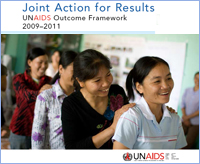
The HIV organizational landscape has evolved and grown more complex over the past decade. UNAIDS, donors and civil society, including networks of people living with HIV, have rightly demanded greater clarity on the relationships between needs, financing, activities and outcomes. Also demanded is greater specificity about the role of UNAIDS and the Secretariat within the wider constellation of actors.
This Outcome Framework, which builds upon the UNAIDS Strategic Framework (2007–2011), will guide future investment and hold the Secretariat and the Cosponsors accountable for making the resources of the UN work for results in countries. It affirms the UNAIDS Secretariat and Cosponsors to leverage our respective organizational mandates and resources to work collectively to deliver results.
Joint action for results: UNAIDS outcome framework, 2009 – 2011 (pdf, 388 Kb)
Joint action for results: UNAIDS outcome framewor
Cosponsors:
Office of the United Nations High Commissioner for Refugees (UNHCR)
United Nations Children's Fund (UNICEF)
World Food Programme (WFP)
United Nations Development Programme (UNDP)
United Nations Population Fund (UNFPA)
United Nations Office on Drugs and Crime (UNODC)
International Labour Organization (ILO)
United Nations Educational, Scientific and Cultural Organization (UNESCO)
World Health Organization (WHO)
World Bank
Publications:
Joint action for results: UNAIDS outcome framework, 2009 – 2011 (pdf, 388 Kb)
Related

Feature Story
OPINION: HIV and drugs: two epidemics - one combined strategy
20 April 2009
20 April 2009 20 April 2009By Michel Sidibé, Executive Director, Joint United Nations Programme on HIV/AIDS (UNAIDS) Geneva, Switzerland
(This article also appeared in the Bangkok Post on 20 April 2009)
At the Mitsamphan drug user harm reduction drop-in centre in Bangkok drug users are able to get clean needles, condoms and counselling. Access to these services allows them to stop HIV, look after their health and lead productive lives. The centre is run by community members, including ex-drug users, and has restored dignity and is giving hope to many. Thanks to many such centres worldwide, new HIV infections among drug users are being stopped. This is not a surprise for the delegates attending the 20th international conference on harm reduction in Bangkok this week. But for a majority of policy makers in national drug programmes, the term ‘harm reduction’ invokes silence and controversy. However nearly 16 million people inject drugs worldwide – 3 million of whom are estimated to be living with HIV – silence on harm reduction therefore is not an option.
National drug control and HIV programmes must work together. They must be informed by evidence and grounded in human rights. Drug issues are complex but they do not take away from the fact that people who inject drugs, just as everyone else, are entitled to the full spectrum of human rights. Evidence shows that harm reduction programmes save lives. Many countries are still not providing access to the harm reduction services. This is killing people as much as the drugs themselves.
Regrettably the 52nd session of the Commission on Narcotic Drugs in March of this year missed an occasion to make a bold political commitment to holistic harm reduction. Yet member states had committed to accelerating access to harm reduction efforts related to drug use in the Political Declaration on AIDS adopted at the UN High level meeting on AIDS in 2006.
But why are drug control authorities against harm reduction? Harm reduction programmes include access to sterile injecting equipment, opioid substitution therapies, and community-based outreach. These are the most cost effective means of reducing HIV-related risk behaviors. They not only prevent transmission of HIV but also of hepatitis C and other blood borne viruses. In Australia, the return on investment of a decade of needle and syringe programmes was estimated at one and half billion US dollars. And in Ukraine, for $0.10 cents per day one drug user can be protected against HIV through the provision of comprehensive harm reduction services.
Countries that have adopted a comprehensive approach to HIV and drug use have seen a decline in the spread of HIV among people who inject drugs. This includes Australia, United Kingdom, France, Italy, Spain, and Brazil, and in some cities in Bangladesh, the Russian Federation, and Ukraine.
We can protect drug users from becoming infected with HIV. China is doing its part. In 2004, there were only 50 needle and syringe programmes. Today there are more than a thousand such programmes in all priority provinces. By achieving universal access targets for 2010, nearly 10 million drug users will be able to access such life saving harm reduction programmes worldwide.
Harm reduction is not an obstacle in reaching the goal of a drug-free world. Drug control authorities need not fear a rise in drug use simply because people are taking steps to protect themselves from HIV and reduce their drug dependency.
There is no evidence that providing harm reduction services has led to more people becoming drug users. There is also no proof that current drug users increase their intake of drugs or choose to use them longer. In contrast to the overwhelmingly beneficial effects of harm reduction, law enforcement approaches alone do little to reduce drug use and drug-related crime and are often associated with serious human rights abuses and poor health outcomes for people who use drugs. They include arbitrary arrests, prolonged detention, compulsory drug registration and unwarranted use of force and harassment by law enforcement officers.
Many drug laws make possessing and distributing sterile needles and syringes an offence, and opioid substitutes such as methadone and buprenorphine are classified as illegal despite being on the WHO list of essential medicines.
When law enforcement and public health efforts come together, the outcomes are very successful – for example in Britain and Australia where drug action teams and police focus on crime fighting and successfully refer drug users to health and welfare services.
The Supreme Court in Indonesia rightly ruled that drug users should not be sent to prison; instead they should have access to treatment. It should not be a crime to access clean needles. It should not be a crime to access substitution therapy.
We need to get rid of drug laws that block the response to AIDS and drug use. HIV and injecting drug use are two epidemics but need a combined strategy. We cannot leave it to the next generation to reconcile the separate approaches to HIV and drug control.
Right Hand Content
Cosponsors:
Feature stories:
International Harm Reduction conference opens in Bangkok (20 April 2009)
OPINION: Silence on harm reduction not an option (11 March 2009)
51st session of the Commission on Narcotic Drugs (11 March 2008)
Reducing drug related harm (14 May 2007)
Injecting drug use: focused HIV prevention works (11 May 2007)
Harm reduction to be scaled up in Ukraine (11 April 2007)
Increased HIV services for drug users needed (14 November 2006)
External links:
Harm Reduction 2009: IHRA’s 20th International Conference
Statements:
Publications:
Best Practice Publication: High Coverage Sites—HIV Prevention among Injecting Drug Users IDU in Transitional and Developing Countries ( En | Fr | Es | Ru )

Feature Story
UNAIDS Executive Director visits Ethiopia
20 April 2009
20 April 2009 20 April 2009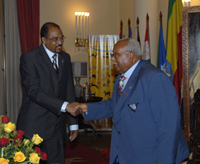
Mr Michel Sidibé (left) met with HE Girma Woldegiorgis, President of the Federal Democratic Republic of Ethiopia.
Credit: UNAIDS/Y.Gebremedhin
The Executive Director of UNAIDS, Michel Sidibé is in Ethiopia to discuss ways of strengthening UN support to the AIDS response in the country.
High on the agenda will be the progress and challenges Ethiopia is facing in scaling up to universal access to HIV, prevention, treatment, care and support. These issues will be discussed in meetings with a range of stakeholders including the Ethiopian authorities, religious leaders, networks of people living with HIV, and senior officials from the African Union Commission.
Whilst in the country Mr Sidibé will also visit projects in Mekelle, a region some 800 km from the capital Addis Ababa. As well as visiting health facilities and care and support projects in the region, he will also meet with local communities to see first hand how universal access is working for people on the ground.
On the final day of the visit Mr Sidibé will meet with the press to present his vision for the future and highlight the urgent need to invigorate momentum and commitment towards achieving universal access and the need for increased investments for countries to reach their goals.
Right Hand Content
Feature stories:
ILO: Action against stigma brings hope to Ethiopia’s agricultural cooperatives (14 April 2009)
Translating intent into action in Ethiopia (25 November 2008)
Multimedia:
Related

Feature Story
International Harm Reduction conference opens in Bangkok
20 April 2009
20 April 2009 20 April 2009Delegates are gathering in Thailand’s capital this week for the 20th international conference on harm reduction running from 20 to 23 April. Organized by the International Harm Reduction Association (IHRA), the conference’s theme is human rights, underscoring the necessity of injecting drug users’ universal access to HIV prevention, treatment, care and support including comprehensive harm reduction programmes.
The four-day event will provide the harm reduction community with the opportunity to share ideas, research and best practices to further advocate for the inclusion of harm reduction in national drug – and AIDS – programmes.
The thematic link between harm reduction and human rights points to the growing understanding that drug users’ impeded access to the full harm reduction package, including clean needles and syringes, substitution therapy, condoms, HIV testing and counselling, infringes upon an individual’s right to highest attainable standard of physical and mental health, without discrimination of any kind.
Laws criminalizing the possession of injecting equipment or substitution therapy are major barriers in responding to HIV, as the fear of criminal measures and prosecution force many drug users underground.
“One of the most significant steps forward we can make to universal access to HIV prevention, treatment, care and support is to stop criminalizing use of needle exchange, methadone treatment and other substitution therapies,” said UNAIDS Executive Director, Michel Sidibé.
Lack of official support for harm reduction in many countries, laws that prohibit key components of harm reduction, and onerous regulatory schemes (e.g. strict import limits on opiate maintenance medications) often make it difficult to implement harm reduction initiatives at all, much less bring such programmes to scale.
Substitution therapy with methadone is available in only 52 countries, and with buprenorphine in only 32 countries. Substitution therapy is largely unavailable in Eastern Europe and Central Asia, where injecting drug use represents the most important mode of HIV transmission.
Important but uneven advances in access to harm reduction
Studies have consistently demonstrated that harm reduction services reduces HIV infections and risk behaviours without contributing to increased drug use or increasing other harms in the communities in which such programmes operate.
Experience in diverse regions has demonstrated the feasibility of bringing harm-reduction programmes to scale, even in the face of official resistance. Common features of high-coverage programmes for injecting drug users include involvement of community organizations, work with law enforcement agencies to minimize harassment, adequate and sustained funding, ease of access for clients, and involvement of injecting drug users in advisory bodies and other appropriate structures.
Recent years have seen important but uneven advances in access to harm reduction in various settings. China, for example, has expanded key components of harm reduction, reaching more than 88 000 individuals with methadone maintenance therapy, and by the end of 2008, establishing 1109 needle exchange programmes in 27 provinces. Viet Nam initiated its first pilot project of methadone substitution therapy in 2008, and harm reduction programmes in the country distributed 15 million condoms and 7.5 million needles and syringes in the first 10 months of 2007. In 2006, Bulgaria, Estonia, Finland, Latvia, and Lithuania created a regional network to expand and coordinate HIV prevention services for injecting drug users, with financing secured until 2009 from the European Commission. In Thailand, by contrast, a recent report by civil society informants found little expansion of harm reduction programmes, despite the national government’s widely publicized 2004 commitment to increase prevention access for drug users.
Aggressive drug control policies often inhibit use of harm-reduction programmes, underscoring the need for inter-ministerial collaboration between Ministries of Health, Interior and Justice and sensitization of law enforcement personnel, to avoid approaches that can deter participation in prevention programmes.
In most countries in Eastern Europe and Central Asia, for example, police sometimes make arrests for possession of extremely small amounts of narcotics, potentially discouraging drug users from participating in needle exchange projects. According to Georgia’s official report to UNAIDS on UNGASS indicators, the national anti-drug policy climate has inhibited efforts to offer even minimal access to detoxification and drug rehabilitation services. In Thailand in 2003, the alleged extrajudicial killings and associated violence, which resulted in the death of more than 2000 suspected drug dealers and users, continues to reverberate through society. Civil society informants report that injecting drug users are afraid to access harm reduction and other health services.
In contrast to the overwhelmingly beneficial effects of harm reduction, law enforcement approaches alone do little to reduce drug use and drug-related crime and are often associated with serious human rights abuses and poor health outcomes for people who use drugs.
When law enforcement and public health efforts come together, the outcomes are very successful. For example in Britain and Australia where drug action teams and police focus on crime fighting and successfully refer drug users to health and welfare services. In Australia, the return on investment of a decade of needle and syringe programmes was estimated at one and half billion US dollars. Furthermore, the Supreme Court in Indonesia ruled that drug users should not be sent to prison; instead they should have access to treatment.
The global drug problem is complex and cannot be solved in isolation. A coming together of organizations working on drug control and AIDS is urgently needed. HIV and injecting drug use are two epidemics but need a combined strategy.
Right Hand Content
Cosponsors:
Feature stories:
OPINION: HIV and drugs: two epidemics—one combined strategy (20 April 2009)
OPINION: Silence on harm reduction not an option (11 March 2009)
51st session of the Commission on Narcotic Drugs (11 March 2008)
Reducing drug related harm (14 May 2007)
Injecting drug use: focused HIV prevention works (11 May 2007)
Harm reduction to be scaled up in Ukraine (11 April 2007)
Increased HIV services for drug users needed (14 November 2006)
External links:
Harm Reduction 2009: IHRA’s 20th International Conference
Statements:
Publications:
Best Practice Publication: High Coverage Sites—HIV Prevention among Injecting Drug Users IDU in Transitional and Developing Countries ( En | Fr | Es | Ru )

Feature Story
UNICEF working to teach AIDS prevention to young people in Guinea
16 April 2009
16 April 2009 16 April 2009A version of this story was first published on UNICEF.org
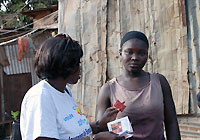
Fatoumata in a salon in a poor Koloma neighbourhood of Conakry. She is 18, has two children, aged six and three, and has never heard of AIDS. Credit: UNICEF Guinea/2009/Baro
Nene Gallé Barry sells charcoal in a very poor area of the Koloma quarter in Conakry, Guinea’s capital. She is 18 now, but left her home village four years ago to earn a living in the city. She has a boyfriend and is sexually active and, until recently, she had never heard of AIDS and had never seen or used a condom.
This is the reality for many adolescents in Guinea. Adolescents often lack access to information that will protect them from sexually transmitted infections (STIs), including HIV. According to a recent UNAIDS/WHO/UNICEF report, in 2007 only 12% of females aged 15 to 24 had correct knowledge of, and rejected myths about, sexual transmission of the virus. In addition, just under a quarter of adolescents aged 15 to 17 used condoms during sexual intercourse, according to a 2005 study.
When Nene finally learned about the risks she had been taking by not using protection, she asked for condoms. She wanted to know how to use them and how to convince her partner to wear them and was very pleased when she’d learned what to do.
Improving youth access to information
In Guinea girls are particularly at risk of contracting STIs. According to the UNAIDS/WHO/UNICEF 2008 report, 31% of girls have had sexual intercourse before the age of 15. (For boys, the figure is 20%). The publication also confirms that girls and women in the 15 to 24 age group are twice more likely to be infected with HIV than their male counterparts.

A group of peer educators enter
a hair salon in Miniere, Conakry.
Credit: UNICEF
Guinea/2009/Baro
A high number of young women are involved in jobs that expose them to unsafe sexual practices; jobs such as selling fruit on the streets or working in hair and sewing salons. In these settings they often meet male adolescents or older men who offer money in exchange for sex.
UNICEF and its national partners have taken major steps to improve youth access to information and informed decision making concerning HIV. The first national prevention strategy for youth was produced in 2007, and a coordinating team has been set up in order to coordinate and scale up activities. For the past two years UNICEF has partnered with JCI (Junior Chamber International) to empower adolescents within poor communities and involve them in projects that reach other vulnerable adolescents, mostly girls.
'My job, my health'
From 2007 to 2008 the programme reached more than 20,000 adolescents ranging in age from 13 to 20, all from different backgrounds. Eight TV spots in four different languages were produced, as well as 20 interactive radio shows.
The newest project is called 'mon MÉtier, ma santé' ('my job, my health'), and aims to reach girls working in hair dressing and tailoring shops in two of the poorest neighbourhoods in Conakry. One hundred peer educators are planning to visit the selected sites and help educate young apprentices and clients about HIV prevention.
It is hoped that once the young girls have received the information about HIV prevention will then reach out to their family members and friends. A study will be conducted after two months of such sensitization activities to evaluate the impact of the project. UNICEF hopes to be able to reach at least 50 per cent of the most vulnerable girls by 2011.
Right Hand Content
Key populations:
Young people
Women and girls
Condoms
HIV prevention
Cosponsors:
Partners:
Junior Chamber International (JCI)
Feature stories:
Barber Shops and Beauty Salons promote HIV education in Guyana (26 March 2009)
Condoms and HIV prevention: Position statement by UNAIDS, UNFPA and WHO (19 March 2009)
Costa Rica: Peer HIV prevention programmes to be promoted for young people (03 March 2009)
Publications:
Best practice: Making condoms work for HIV prevention (pdf, 1.1 Mb)
UNAIDS action plan on intensifying HIV prevention (pdf, 1.71 Mb)
Related

Feature Story
ILO: Action against stigma brings hope to Ethiopia’s agricultural cooperatives
14 April 2009
14 April 2009 14 April 2009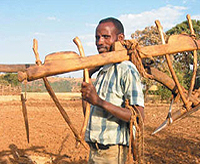
Ajama Kalacha gets ready to plough his field. His community’s support has made it easier for him to cope with HIV Credit: ILO
Ajama Kalacha works hard on his small agricultural plot in Ethiopia’s highlands to provide an income for the extended family he supports. Even though life is tough, Ajama is an optimist - his community treats him well and he believes his prospects for making a living from the land are good. But he was not always so confident.
Seven years ago, Ajama discovered that he had become infected with HIV. At the time stigma and discrimination were widespread in his community and the diagnosis led him to despair. Today Ajama is taking antiretroviral treatment and his health is stable. He has told everyone about his HIV status, and his children and extended family have not been excluded from school or community life as he had once feared.
“My message to others is that living positively with HIV helps you to work harder and leads to a new lifestyle,” he says. “The care and support that I have received has made it much easier for me to cope with my illness.”
This dramatic change in Ajama’s attitude and circumstances came about in 2004 when his agricultural cooperative society in West Oromia State became part of a wider programme to reduce the negative effects of HIV. Funded by the Italian government in cooperation with the International Labour Organization (ILO), the programme works through the Oromia region agricultural cooperative unions that have members in over 200 agricultural primary societies and 14 transport associations.
To ensure that interventions were at the right level, staff carried out an initial study of HIV knowledge and attitudes, which revealed many misunderstandings. For instance, 51 per cent of those interviewed thought HIV could be transmitted by mosquito bites, 17 per cent by sharing a toilet and 6 per cent by working with an HIV-positive person.
The programme has strong support from government and the national cooperative leadership. It works through a range of training approaches, firstly raising awareness of HIV among leaders and then, through specific workshops, training a network of master trainers and peer educators. They in turn roll out the programme at community level, helping to challenge discrimination, change behaviour which may risk exposure to HIV, and set up care and support services for members and their families.
Easily identified by their bags and T-shirts that both bear the slogan, ‘HIV does not discriminate, but people do,’ the peer educators work with the whole community visiting homes, speaking at local gatherings and involving key individuals such as religious leaders. They use an HIV manual and distribute popular information materials that have been translated into the local languages of Afaan Oromo and Amharic. They also help to provide care and support services including treatment.
In Ajama’s cooperative, misunderstandings about HIV, together with the stigma and discrimination directed against those affected, have gradually reduced as a result of this steady work. The positive environment and encouragement he has received gave Ajama the courage to speak out about his status and to have hope for the future.
“I set my mind to starting a new life,” he says. “The care and support for people living with HIV and AIDS has helped greatly to reduce its impact on our lives.”
Right Hand Content
Cosponsors:
Feature stories:
Faces against HIV stigma and discrimination (01 October 2008)
International labour standard would strengthen the HIV response in the workplace (21 July 2008)
ILO sees significant improvement in workplace attitudes to HIV (25 April 2008)
Making a difference: UNAIDS in Ethiopia (08 February 2008)
Publications:
Saving lives, protecting jobs. SHARE Report ( pdf, 3.7 Mb.) ( fr )
ILO Code of Practice on HIV in the workplace
Reducing HIV stigma and discrimination: a critical part of national AIDS programmes (pdf, 598 kb.)
AIDS is everybody's business: partnerships with the private sector (pdf, 1 Mb.)
Greater involvement of people living with HIV (GIPA) (pdf, 245 kb.)
Facts sheets on ILO work and partnerships in Africa:
Ethiopia
Benin ( Fr )
Botswana
Burkina Faso ( Fr )
Ghana
Lesotho
Malawi
Mozambique
South Africa
Swaziland
Togo ( Fr )
Zambia
Zimbabwe
Related

Feature Story
Leadership in Senegal’s AIDS response
09 April 2009
09 April 2009 09 April 2009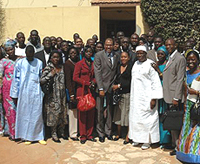
Michel Sidibé UNAIDS Executive Director and representatives from national civil society organizations and regional networks of people living with HIV after their meeting at SIDA Service, 9 April 2009.
Credit: UNAIDS/C.Diop
UNAIDS estimates that one per cent of adults in Senegal are living with HIV. In 1992, at a time when the full impact of AIDS on society was only beginning to be recognised in the country, the Catholic church in Senegal founded “SIDA Service,” an organization to support and care for people living with or affected by HIV.
Since those early days, and continuing today, it actively seeks to change peoples’ attitudes of stigma towards, and discrimination against, people living with HIV.
SIDA Service has grown to 500 volunteers and employees with 23 branches across Senegal as well as a presence in neighbouring Guinea Bissau and Gambia. Its Dakar health centre was the first in the country to offer HIV testing that is free, voluntary and confidential. In addition to voluntary counselling and testing and support to people living with HIV, SIDA Service also cares for orphans and vulnerable children.
While in Senegal this week, UNAIDS Executive Director Michel Sidibé visited the SIDA Service’s health centre which is making a significant the contribution towards Senegal’s goal of universal access to HIV treatment, prevention, care and support. His visit took place on Wednesday 8 April where he had an opportunity to listen to those who use the services.
The medical team at the centre offer a range of services to the local community including HIV treatment, treatment of opportunistic infections, gynaecological health and pre-natal services. There is a laboratory for biomedical analysis and an on-site pharmacy. In addition to health care, food support is available and staff and volunteers offer time to listen as well as give counselling, psycho-social support and spiritual care to any in need.
SIDA Service has also led in promoting dialogue within faith communities on AIDS. It has co-organized a number of important conferences and gatherings of religious communities on AIDS in Africa and was a founding member of the National Alliance of Religious and Medical Experts against AIDS in 1999.
Mr Sidibé also met with civil society leaders in Senegal as well as from wider the West Africa region.
President Abdoulaye Wade

President Abdoulaye Wade of Senegal (front right) hosted a meeting with Michel Sidibé UNAIDS Executive Director. Also present were (from left) Dr Meskerem Grunitzky Bekele, Director, UNAIDS Regional Support Team for West and Central Africa; and United Nations Resident Coordinator Mr Bouri Jean Victor Sanhouidi.
Credit: UNAIDS/C.Diop
Later on Wednesday Mr Michel Sidibé met with Senegal’s President Abdoulaye Wade where they discussed Senegal’s progress in the national AIDS response. The country has made good progress in access to HIV treatment in recent years with 56 per cent of people in need of HIV treatment accessing it in 2007, up from 26 per cent in 2004.
Mr Sidibé also met with the Senegalese Minister of Health Dr Safiatou Thiam.
Regional Dialogue on Universal Access in West and Central Africa
On Thursday, Mr Sidibé opened a Regional Dialogue on Universal Access in West and Central Africa.
The Dialogue was chaired by Dr Thiam and brought together senior government and UN officials, civil society from across West and Central Africa including representatives from networks of people living with HIV, representatives from donor countries and the Global Fund.
Addressing the gathering Mr Sidibé urged participants to work together to achieve universal access which he said “is more than a motto but a way to bring about fundamental transformation.”
He called for AIDS to remain a political priority of governments in the region and emphasized the need for an expansion of HIV prevention efforts. Expanded partnerships including with the women’s movement, TB community, others working on development goals, are key to the strategy of universal access he proposed. Mr sidibé also called for respect for human rights: “I ask the UN system, governments and civil society to come together to build a response to HIV that does not drive people underground through fear of the criminal law”.
Dr Luis Gomes Sambo, Regional Director for Africa, WHO; Mr Jean-Christophe Deberre, Deputy Regional Director for West and Central Africa, UNDP; and Dr Meskerem Grunitzky Bekele, Director, UNAIDS Regional Support Team for West and Central Africa also spoke.
Mr Sidibé will conclude his visit later today by meeting with the First Lady of Senegal, Ms Viviane Wade who is a long term advocate on AIDS and health issues in her country and an active member of Organization of African First Ladies against HIV/AIDS.
Right hand copntent
Feature stories:
ICASA 2008 3-7 December 2008 (07 December 2008)
Understanding HIV transmission for an improved AIDS response in West Africa (03 December 2008)
Press centre:
UNAIDS and broad coalition working towards the release of nine men who have sex with men in Senegal who have been convicted and imprisoned (15 January 2009
Multimedia:
External links:
Organisation of African First Ladies against HIV/AIDS
Publications:
Senegal 2008 UNGASS Country Progress Report (French only)
The Alliance of religious and medical experts in the response to the AIDS epidemic in Senegal. The medical, coranic and biblical principles that every religious believer should read, know and apply (pdf, 365 Kb) (in French)

